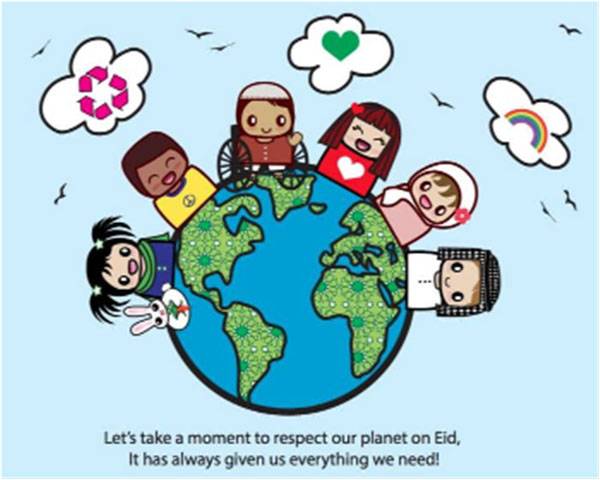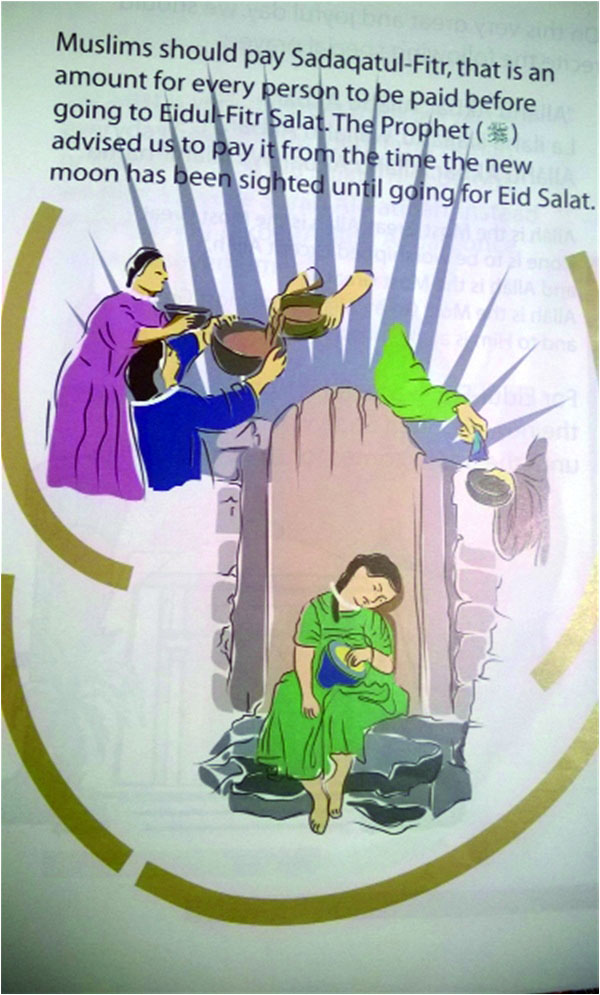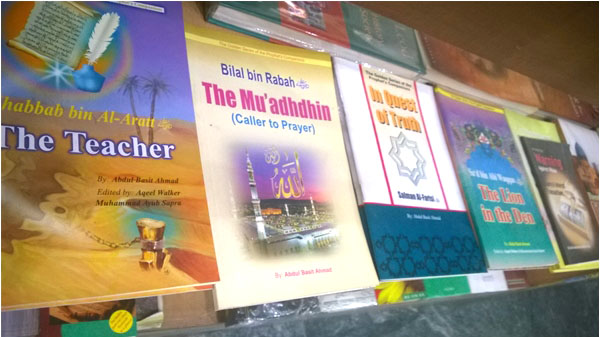
Giving a book as a gift on Eid isn’t the most usual thing to do. In fact the concept of giving a gift as opposed to paper money is in itself alien when it comes to Eid traditions, at least in the sub-continent. But giving a child a book is often to open them up to a whole new world, and kids, Muslim or otherwise, need books to stimulate their imaginations and to introduce them to ideas they are unfamiliar with. In this regard books on Muslim traditions and Eid should fill a gap in the market. But the books need to offer more than just words for a truly immersive experience. Over the last few years, we’ve seen an increase in the number of religious books aimed at teaching kids the basics of their faith. Packed with feel-good messages and life lessons, these books are meant to help children find their way around life through the morals they deliver; however, most of them seem to further the same homogenous messages instead of offering something unique to their target audience.
One of the key aspects of local children’s story books in the market today is a stress on didactism and moral preaching. By sheer coincidence or perhaps by design, these books often repeat the same kind of points, the same stories, and end up teaching children exactly the same lessons. What this does is to actively ensure that nothing is left to the child’s imagination, thus confining kids to think in restrictive ways that can often lead to bigotry and prejudice.

Shazia Nalee’s ‘The Gift of Eid’ for instance, tries to explain Eid-ul-Fitr and Eid-ul-Adha to its young readersIt would have benefitted from a more interactive and accessible apparoach, instead it tells them what is what and leaves it at that. There is no room for a child to bother engaging with the book beyond what lies before her. The book uses people and animals to make its point but has the heads severed so that it remains in line with Islamic rules passed onto the author by Muslim scholars. It begs the question: how will a child comprehend why people and animals are all headless in the book?
This kind of orthodox thinking and conformism seems to permeate most books in the market that have a religious aim. Their language is also often too preachy to appeal to a young child’s sense of fun and adventure, something expected when reading about a celebration.
[quote]This good idea, however is marred by unimaginative plagiarizing from Mother Goose nursery rhymes[/quote]
‘Eid and Ramadan Songs’ is another book that tackles the same theme. Penned by Fawzia Gillani Williams, it uses poetry and songs to convey its message. This good idea, however is marred by unimaginative plagiazing from Mother Goose nursery rhymes. Several of the poems are replicas of these tweaked to accommodate messages about Islam. The poem ‘Tasneem Tasneem’, for instance, will do more to confuse a child because of its plagiarism than help make them feel more connected to whatever they are reading. Even the rhyming itself is pretty poor and this not catchy.
“Tasneem Tasneem where do you go?
I’m off to the masjid to see the Eid show,
Tasneem Tasneem what did you see?
I see candies, cookies and tea,
Tasneem Tasneem what did you do?
I help with the children and games that are,
Tasneem Tasneem Eid Mubarak
Shukran, may Allah give you good luck!”
A break from this pattern is a book created by Pakistani-Canadian author Eiynah. Released on Eid-ul-Fitr this year and simply titled the ‘Eid Book’ this rendition tackles the same subject as the other two but more uniquely. Instead of focusing on traditionally ‘pious’ ideas and making Eid all about religious duties and traditions, this book seems to normalize the Muslim child’s experience by placing his or her festival in normal, everyday circumstances, pushing Eid into the secular realm, something all kids in the sub-continent know and understand but find rarely represented in books. “Eid can begin with a prayer – or even just a feeling… that comes from your heart,” she writes, in an attempt at normalizing all kinds of ways of celebrating Eid, instead of the cookie cutter mosque and prayer model.

This little ‘Eid Book’ even goes as far as touching on the issue of the environment and how children need to respect the planet that gives them all they have. Considering how many Islamic countries are currently marred by religious extremism and fanaticism, messages about diversity and inclusivity are a welcome effort. And if they are delivered to children in a manner which captures their imagination then all the better.
However, Eiynah’s book is not yet readily available in Pakistani bookstores and can only be ordered online. It is important that Pakistani bookstores encourage such attempts at change and diversity and bring them to the market, considering the general low standard of children’s books here in general, and ones on Islamic themes in particular.
One of the key aspects of local children’s story books in the market today is a stress on didactism and moral preaching. By sheer coincidence or perhaps by design, these books often repeat the same kind of points, the same stories, and end up teaching children exactly the same lessons. What this does is to actively ensure that nothing is left to the child’s imagination, thus confining kids to think in restrictive ways that can often lead to bigotry and prejudice.

Shazia Nalee’s ‘The Gift of Eid’ for instance, tries to explain Eid-ul-Fitr and Eid-ul-Adha to its young readersIt would have benefitted from a more interactive and accessible apparoach, instead it tells them what is what and leaves it at that. There is no room for a child to bother engaging with the book beyond what lies before her. The book uses people and animals to make its point but has the heads severed so that it remains in line with Islamic rules passed onto the author by Muslim scholars. It begs the question: how will a child comprehend why people and animals are all headless in the book?
This kind of orthodox thinking and conformism seems to permeate most books in the market that have a religious aim. Their language is also often too preachy to appeal to a young child’s sense of fun and adventure, something expected when reading about a celebration.
[quote]This good idea, however is marred by unimaginative plagiarizing from Mother Goose nursery rhymes[/quote]
‘Eid and Ramadan Songs’ is another book that tackles the same theme. Penned by Fawzia Gillani Williams, it uses poetry and songs to convey its message. This good idea, however is marred by unimaginative plagiazing from Mother Goose nursery rhymes. Several of the poems are replicas of these tweaked to accommodate messages about Islam. The poem ‘Tasneem Tasneem’, for instance, will do more to confuse a child because of its plagiarism than help make them feel more connected to whatever they are reading. Even the rhyming itself is pretty poor and this not catchy.
“Tasneem Tasneem where do you go?
I’m off to the masjid to see the Eid show,
Tasneem Tasneem what did you see?
I see candies, cookies and tea,
Tasneem Tasneem what did you do?
I help with the children and games that are,
Tasneem Tasneem Eid Mubarak
Shukran, may Allah give you good luck!”
A break from this pattern is a book created by Pakistani-Canadian author Eiynah. Released on Eid-ul-Fitr this year and simply titled the ‘Eid Book’ this rendition tackles the same subject as the other two but more uniquely. Instead of focusing on traditionally ‘pious’ ideas and making Eid all about religious duties and traditions, this book seems to normalize the Muslim child’s experience by placing his or her festival in normal, everyday circumstances, pushing Eid into the secular realm, something all kids in the sub-continent know and understand but find rarely represented in books. “Eid can begin with a prayer – or even just a feeling… that comes from your heart,” she writes, in an attempt at normalizing all kinds of ways of celebrating Eid, instead of the cookie cutter mosque and prayer model.

This little ‘Eid Book’ even goes as far as touching on the issue of the environment and how children need to respect the planet that gives them all they have. Considering how many Islamic countries are currently marred by religious extremism and fanaticism, messages about diversity and inclusivity are a welcome effort. And if they are delivered to children in a manner which captures their imagination then all the better.
However, Eiynah’s book is not yet readily available in Pakistani bookstores and can only be ordered online. It is important that Pakistani bookstores encourage such attempts at change and diversity and bring them to the market, considering the general low standard of children’s books here in general, and ones on Islamic themes in particular.

